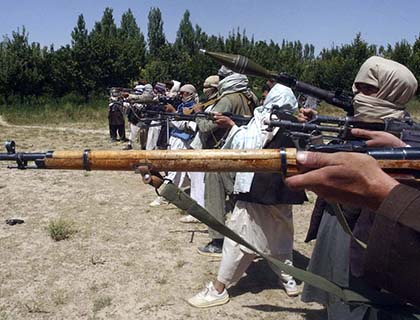The radical groups of Taliban have been brainwashed and fed by poisonous beliefs which do not lead to the death of themselves but also of many more innocent people around the world. Their fundamental ideology stereotypes many other sects as non-Muslims and announce jihad against them. They are trained military techniques in madrasahs and sent to carry out acts of murder. Their regime ruled Afghanistan despotically for five years and also launched terrorist attacks on New York City of America which finally led to the collapse of their regime.
According to a 55-page report by the United Nations, the Taliban committed systematic massacres against civilians while trying to consolidate control over northern and western Afghanistan. UN officials stated that there had been “15 massacres” between 1996 and 2001. They also said that these have been highly systematic and they all lead back to the Taliban Ministry of Defense or to Mullah Omar himself. “These are the same type of war crimes as were committed in Bosnia and should be prosecuted in international courts”, one UN official was quoted as saying. Bin Laden’s so-called 055 Brigade was responsible for mass-killings of Afghan civilians. The report by the UN quotes “eyewitnesses in many villages describing Arab militants carrying long knives used for slitting throats and skinning people.” The Taliban’s former ambassador to Pakistan, Mullah Abdul Salam Zaeef, in late 2011 stated that cruel behavior under and by the Taliban had been “necessary.”
In 1998, the UN accused the Taliban of denying emergency food by the UN’s World Food Program to 160,000 hungry and starving people “for political and military reasons.” The United Nations said the Taliban were starving people for their military agenda and using humanitarian assistance as a weapon of war.
On August 8, 1998 the Taliban launched an attack on Mazar-e Sharif. Of 1500 defenders only 100 survived the engagement. Once in control the Taliban began to kill people indiscriminately. They even shot people in the street. Women were raped, and thousands of people were locked in containers and left to suffocate. This ethnic cleansing left an estimated 5,000 to 6,000 dead. Meanwhile, 10 Iranian diplomats and a journalist were killed. Iran assumed the Taliban had murdered them, and mobilized its army, deploying men along the border with Afghanistan. By the middle of September there were 250,000 Iranian personnel stationed on the border. Pakistan mediated and the bodies were returned to Tehran towards the end of the month. The killings of the Diplomats had been carried out by Sipah-e-Sahaba a radical group in Pakistan. They burned orchards, crops and destroyed irrigation systems, and forced more than 100,000 people from their homes with hundreds of men, women and children still unaccounted for.
In a major effort to retake the Shomali plains from the United Front, the Taliban indiscriminately killed civilians, while uprooting and expelling the population. Among others, Kamal Hossein, a special reporter for the UN, reported on these and other war crimes. The city of Istalif was home to more than 45,000 people. In Istalif the Taliban gave 24 hours notice to the population to leave, and then completely razed the town leaving the people destitute.
In 1999 the town of Bamyan was taken, hundreds of men, women and children were executed. Houses were razed and some were used for forced labor. There was a further massacre at Yakawlang district in January 2001. An estimated 300 people were murdered, along with two delegations of Hazara elders who had tried to intercede.
By 1999, the Taliban had forced hundreds of thousands of people from the Shomali Plains and other regions conducting a policy of scorched earth burning homes, farm land and gardens.
In 1996 bin Laden issued his first fatwa, calling for American soldiers to leave Saudi Arabia.
In a second fatwa in 1998, bin Laden outlined his objections to US foreign policy with respect to Israel, as well as the continued presence of American troops in Saudi Arabia after the Gulf War. Bin Laden used Islamic texts to exhort Muslims to attack American until the stated grievances and reversed, and according to bin Laden, Muslim legal scholars, “have throughout Islamic history unanimously agreed that the jihad is an individual duty if the enemy destroys the Muslim countries.
Al-Qaeda wrote, “for over seven years the United States has been occupying the lands of Islam in the holiest of places, the Arabian Peninsula, plundering its riches, dictating to its rulers, humiliating its people, terrorizing its neighbors, and turning its bases in the Peninsula into a spearhead through which to fight the neighboring Muslim peoples.”
The 9/11 attacks occurred which targeted World Trade Center complex. Although the group’s leader, Osama bin Laden, initially denied any involvement, in 2004, he claimed responsibility for the attacks. Al-Qaeda and bin Laden cited US support of Israel, the presence of US troops in Saudi Arabia, and sanctions against Iraq as motives for the attacks.
After the attacks, bin Laden and al-Zawahiri released additional video and audio tapes, some of which repeated those reasons for the attacks. Two particularly important publications were bin Laden’s 2002 “Letter to America” and a 2004 video tape by bin Laden.
The United States responded to the attacks by launching the War on Terror and invading Afghanistan to depose the Taliban, which had harbored al-Qaeda. Many countries strengthened their anti-terrorism legislation and expanded law enforcement powers. Having evaded capture for years, bin Laden was located and killed by US forces in May 2011.
On October 7, 2001, the War in Afghanistan began when US and British forces initiated aerial bombing campaigns targeting Taliban and al-Qaeda camps, and then later invaded Afghanistan with ground troops of the Special Forces. The overthrow of the Taliban rule of Afghanistan by a US-led coalition was the second-biggest operation of the US Global War on Terrorism outside of the United States, and the largest directly connected to terrorism. Terrorism is still a big challenge in Afghanistan threatening the life of Afghan police, civilians and foreign forces.

